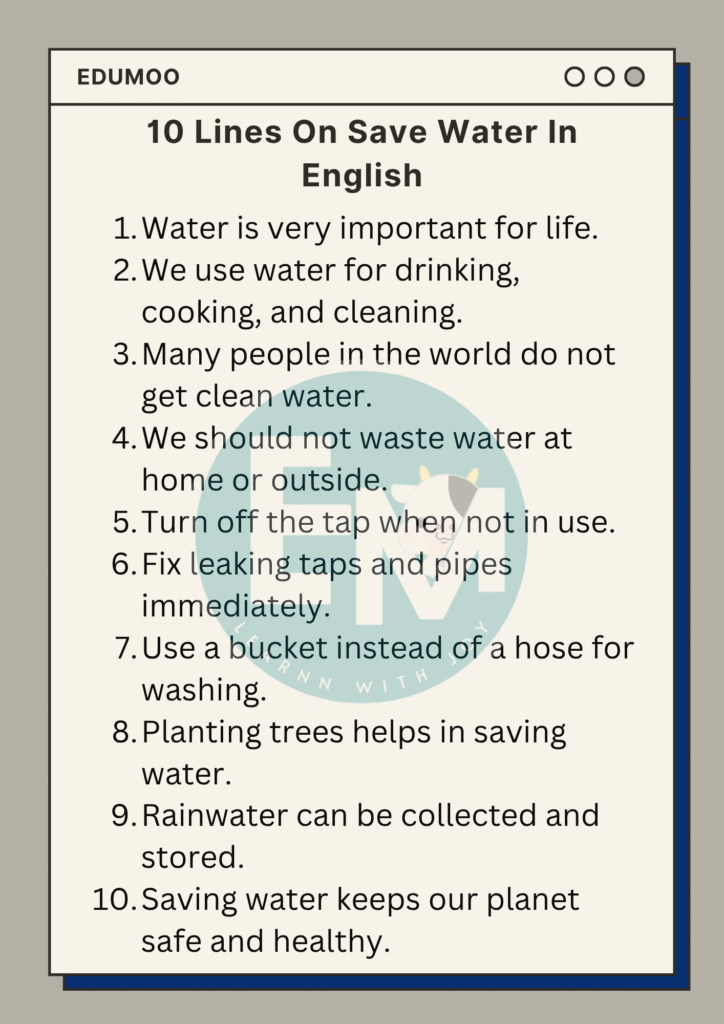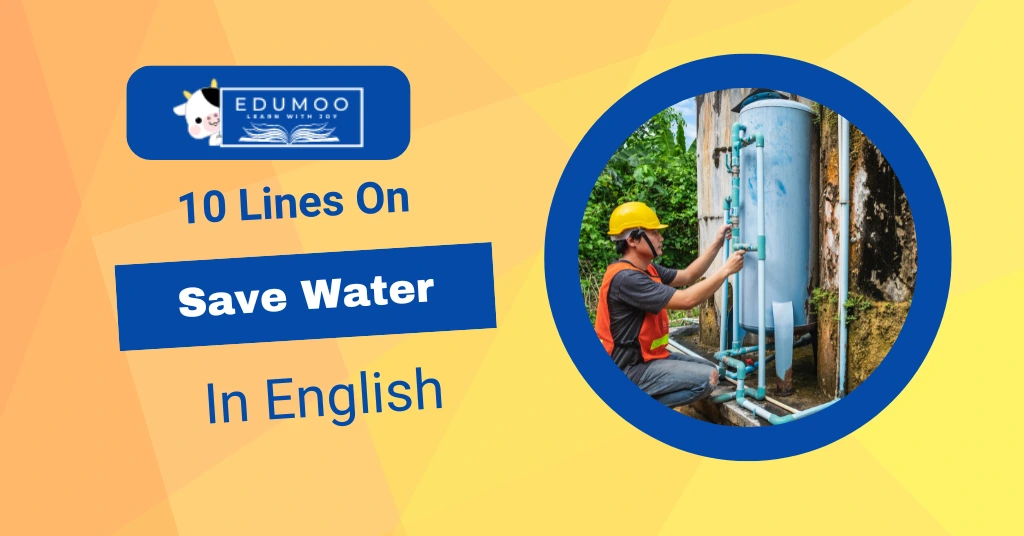Water is one of the most precious gifts of nature. Without water, life cannot exist. Sadly, many people waste water without thinking, and some areas in the world face water shortage. Saving water is very important to keep our environment healthy and ensure everyone has enough to drink and use. Simple actions, like turning off taps when not needed, fixing leaks, and using water wisely, can make a big difference. Even small steps at home, school, or in the community help save water for future generations. Learning to save water is not just a habit but a responsibility for every person.
10 Lines On Save Water In English
- Water is very important for life.
- We use water for drinking, cooking, and cleaning.
- Many people in the world do not get clean water.
- We should not waste water at home or outside.
- Turn off the tap when not in use.
- Fix leaking taps and pipes immediately.
- Use a bucket instead of a hose for washing.
- Planting trees helps in saving water.
- Rainwater can be collected and stored.
- Saving water keeps our planet safe and healthy.

Essay On Save Water In English In 300 Words
Water is one of the most valuable resources on Earth. It is essential for drinking, cooking, cleaning, farming, and industrial work. Without water, no plant, animal, or human can survive. Unfortunately, water is limited, and many people around the world do not have access to clean water. That is why saving water has become very important.
One of the main reasons for water shortage is wastage. Many people leave taps running while brushing, washing hands, or cleaning dishes. Leaking pipes and broken taps also waste a lot of water every day. By fixing leaks and turning off taps when not in use, we can save a huge amount of water. Collecting rainwater is another effective way to conserve water. This water can be used for gardening, washing, or other daily activities.
We should also use water wisely in agriculture. Farmers can adopt modern irrigation methods like drip irrigation, which uses less water compared to traditional methods. Planting trees and protecting forests help maintain the water cycle. Trees absorb rainwater and release it slowly into the soil, which keeps rivers and lakes full.
Schools, communities, and households can take steps to spread awareness about water conservation. Teaching children to save water and encouraging families to use water responsibly can make a big difference. Simple habits, like using buckets instead of hoses, reusing water for multiple purposes, and avoiding water pollution, are very helpful.
In conclusion, saving water is not just a personal duty but a responsibility for everyone. Every drop of water counts, and small actions by individuals can lead to a big positive change. By using water carefully, protecting natural sources, and creating awareness, we can ensure that future generations will have enough water to live healthy and happy lives. Water is life, and saving it means saving our future.
Essay On Save Water In English In 650 Words
Water is one of the most important resources on Earth. Every living being—humans, animals, and plants—needs water to survive. Without water, life is impossible. We use water for drinking, cooking, cleaning, farming, and industrial purposes. Rivers, lakes, and underground water provide us with the water we need. Even though Earth is called the “blue planet,” only a small part of its water is fresh and suitable for drinking. This makes saving water extremely important for all of us.
Unfortunately, many people waste water every day without thinking about its importance. Taps are left running while brushing teeth, washing hands, or cleaning utensils. Leaking pipes and broken taps are also a major cause of water wastage. In many countries, millions of liters of water are wasted every day due to carelessness. Water pollution caused by industrial waste, sewage, and chemicals makes the problem worse. Polluted water cannot be used for drinking or farming, which creates scarcity. This shows that water is a precious gift, and we must use it wisely.
One simple way to save water at home is by using it carefully. Turning off taps while not in use, taking shorter showers, and collecting water used for washing vegetables to water plants can save many liters of water daily. Fixing leaks in taps and pipelines immediately is another easy but effective step. Using buckets instead of hoses while cleaning vehicles or floors also helps in reducing water wastage. Small actions at home, school, and workplace can have a big impact on conserving water.
Water conservation is not only a personal responsibility but also a community effort. Rainwater harvesting is a traditional and effective way to collect water. In this method, rainwater is collected from rooftops and stored in tanks or ponds. This water can be used later for gardening, washing, or even drinking after purification. Many villages and cities around the world are adopting rainwater harvesting to reduce water shortage. Planting trees and protecting forests is another important step. Trees help in maintaining the water cycle by absorbing rainwater and releasing it slowly into the soil, which replenishes rivers and underground water.
Agriculture uses the largest amount of water, so farmers need to adopt modern irrigation methods. Traditional methods like flood irrigation waste a lot of water. Techniques like drip irrigation and sprinkler systems save water and help crops grow better. Farmers can also grow crops that need less water in dry areas. By using water efficiently in agriculture, a huge amount of water can be conserved.
Water pollution is another serious issue. Industrial waste, pesticides, and chemicals contaminate rivers and lakes. Polluted water is dangerous for humans and animals. Protecting water sources from pollution is essential. People should avoid dumping plastic, chemicals, and other wastes into rivers and ponds. Schools and communities can organize awareness campaigns to educate children and adults about the importance of clean water and water-saving habits.
Every individual has a role in saving water. Children can learn simple habits like turning off taps, using water carefully, and spreading awareness among friends and family. Adults can fix leaks, collect rainwater, and avoid polluting rivers. Communities can take larger steps, such as building water storage tanks, promoting tree plantation, and encouraging modern farming methods. Government and organizations can support by providing clean water, maintaining infrastructure, and running awareness programs.
In conclusion, water is life, and saving it is the responsibility of every person. Every drop of water counts, and even small steps can make a big difference. Using water wisely, preventing wastage, reducing pollution, planting trees, and adopting modern irrigation techniques are all important for water conservation. If we do not save water today, future generations may face severe shortages. By learning to value water and use it carefully, we can ensure a healthy and sustainable life for ourselves and the planet. Saving water is not just a habit—it is a duty toward nature and humanity. Let us all pledge to save water and protect this precious gift for a better future.
Conclusion
Today, we have learnt 10 lines on save water. Saving water is not only about protecting this resource but also about protecting life itself. Every drop of water counts, and small efforts from each person can lead to big changes. By using water carefully, planting trees, and reusing water wherever possible, we can make a huge difference. Children, adults, and communities all have a role to play in saving water. If we act today, future generations will have enough water to drink, cook, and live a healthy life. Let’s all promise to save water and make our planet a better place for everyone.

